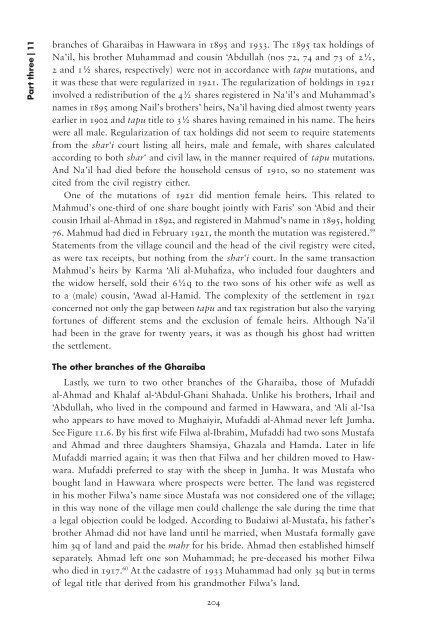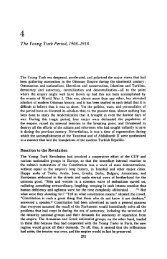Governing property, making the modern state - PSI424
Governing property, making the modern state - PSI424
Governing property, making the modern state - PSI424
You also want an ePaper? Increase the reach of your titles
YUMPU automatically turns print PDFs into web optimized ePapers that Google loves.
Part three | 11<br />
branches of Gharaibas in Hawwara in 1895 and 1933. The 1895 tax holdings of<br />
Na’il, his bro<strong>the</strong>r Muhammad and cousin ‘Abdullah (nos 72, 74 and 73 of 2½,<br />
2 and 1½ shares, respectively) were not in accordance with tapu mutations, and<br />
it was <strong>the</strong>se that were regularized in 1921. The regularization of holdings in 1921<br />
involved a redistribution of <strong>the</strong> 4½ shares registered in Na’il’s and Muhammad’s<br />
names in 1895 among Nail’s bro<strong>the</strong>rs’ heirs, Na’il having died almost twenty years<br />
earlier in 1902 and tapu title to 3½ shares having remained in his name. The heirs<br />
were all male. Regularization of tax holdings did not seem to require <strong>state</strong>ments<br />
from <strong>the</strong> shar‘i court listing all heirs, male and female, with shares calculated<br />
according to both shar‘ and civil law, in <strong>the</strong> manner required of tapu mutations.<br />
And Na’il had died before <strong>the</strong> household census of 1910, so no <strong>state</strong>ment was<br />
cited from <strong>the</strong> civil registry ei<strong>the</strong>r.<br />
One of <strong>the</strong> mutations of 1921 did mention female heirs. This related to<br />
Mahmud’s one-third of one share bought jointly with Faris’ son ‘Abid and <strong>the</strong>ir<br />
cousin Irhail al-Ahmad in 1892, and registered in Mahmud’s name in 1895, holding<br />
76. Mahmud had died in February 1921, <strong>the</strong> month <strong>the</strong> mutation was registered. 59<br />
Statements from <strong>the</strong> village council and <strong>the</strong> head of <strong>the</strong> civil registry were cited,<br />
as were tax receipts, but nothing from <strong>the</strong> shar‘i court. In <strong>the</strong> same transaction<br />
Mahmud’s heirs by Karma ‘Ali al-Muhafiza, who included four daughters and<br />
<strong>the</strong> widow herself, sold <strong>the</strong>ir 6½q to <strong>the</strong> two sons of his o<strong>the</strong>r wife as well as<br />
to a (male) cousin, ‘Awad al-Hamid. The complexity of <strong>the</strong> settlement in 1921<br />
concerned not only <strong>the</strong> gap between tapu and tax registration but also <strong>the</strong> varying<br />
fortunes of different stems and <strong>the</strong> exclusion of female heirs. Although Na’il<br />
had been in <strong>the</strong> grave for twenty years, it was as though his ghost had written<br />
<strong>the</strong> settlement.<br />
The o<strong>the</strong>r branches of <strong>the</strong> Gharaiba<br />
Lastly, we turn to two o<strong>the</strong>r branches of <strong>the</strong> Gharaiba, those of Mufaddi<br />
al-Ahmad and Khalaf al-‘Abdul-Ghani Shahada. Unlike his bro<strong>the</strong>rs, Irhail and<br />
‘Abdullah, who lived in <strong>the</strong> compound and farmed in Hawwara, and ‘Ali al-‘Isa<br />
who appears to have moved to Mughaiyir, Mufaddi al-Ahmad never left Jumha.<br />
See Figure 11.6. By his first wife Filwa al-Ibrahim, Mufaddi had two sons Mustafa<br />
and Ahmad and three daughters Shamsiya, Ghazala and Hamda. Later in life<br />
Mufaddi married again; it was <strong>the</strong>n that Filwa and her children moved to Hawwara.<br />
Mufaddi preferred to stay with <strong>the</strong> sheep in Jumha. It was Mustafa who<br />
bought land in Hawwara where prospects were better. The land was registered<br />
in his mo<strong>the</strong>r Filwa’s name since Mustafa was not considered one of <strong>the</strong> village;<br />
in this way none of <strong>the</strong> village men could challenge <strong>the</strong> sale during <strong>the</strong> time that<br />
a legal objection could be lodged. According to Budaiwi al-Mustafa, his fa<strong>the</strong>r’s<br />
bro<strong>the</strong>r Ahmad did not have land until he married, when Mustafa formally gave<br />
him 3q of land and paid <strong>the</strong> mahr for his bride. Ahmad <strong>the</strong>n established himself<br />
separately. Ahmad left one son Muhammad; he pre-deceased his mo<strong>the</strong>r Filwa<br />
who died in 1917. 60 At <strong>the</strong> cadastre of 1933 Muhammad had only 3q but in terms<br />
of legal title that derived from his grandmo<strong>the</strong>r Filwa’s land.<br />
204












